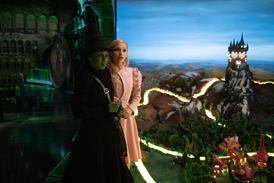Global grosses rose with each of the three Lord Of The Rings releases. Can Peter Jackson’s The Hobbit [pictured] improve on the original trilogy? Ian Sandwell reports
If it were not for a certain boy wizard, the phrase ‘one ring to rule them all’ could have been applied to The Lord Of The Rings trilogy at the global box office: while Harry Potter And The Philosopher’s Stone’s $974.8m saw it top the worldwide charts in 2001 ahead of The Fellowship Of The Ring’s impressive $871.5m, the following Rings instalments lorded over the charts in 2002 and 2003 thanks to returns of $926m for The Two Towers and $1.1bn for The Return Of The King.
The series-topping success of the climactic instalment — not just at the box office but the Oscars too, where The Return Of The King won each of the 11 categories in which it was nominated — has set a daunting precedent for The Hobbit: An Unexpected Journey. Having changed directorial hands from Guillermo del Toro, The Hobbit sees Peter Jackson return to the Shire for a second trilogy after the original plan for two films based on JRR Tolkien’s classic novel morphed into three films.
Warner Bros is releasing The Hobbit trilogy worldwide with domestic dates for part two — The Desolation Of Smaug — and part three — There And Back Again — set for Dec 13, 2013 and July 18, 2014, respectively. First up is An Unexpected Journey, which is released day-and-date in the majority of international territories on or around Dec 14, before releases in Russia on Dec 19 and Australia on Dec 26. A release in China is scheduled for January, where it could come up against Skyfall.
If it follows the pattern set by The Lord Of The Rings trilogy, The Hobbit: An Unexpected Journey can expect some healthily consistent returns in a number of major territories. Leading the way is the UK, where the first trilogy enjoyed a gradual increase throughout, from Fellowship Of The Ring’s $90.2m haul to The Return Of The King’s mighty $106.6m. All three instalments rank in the UK box office’s all-time top 10.
Gradual increases over the trilogy are commonplace in The Lord Of The Rings’ leading international territories. Australia leapt from $24.7m for Fellowship to $36.6m for Return; Spain from $28.2m to $39.8m; and South Korea from $15.5m to $28.5m. Perhaps most impressive was Return’s performance in Japan, where after a slight drop from $68.1m for Fellowship to $65m for The Two Towers, Return climaxed with a stunning $95m. Even if this was only good enough to make it Japan’s third-biggest grosser of the year, behind Howl’s Moving Castle ($190m) and Harry Potter And The Prisoner Of Azkaban ($121.6m), the result made Japan the second-biggest international market for The Return Of The King.
Overall, Germany ranks as the second most successful international territory across The Lord Of The Rings trilogy, contributing $244.8m to the overall $2.9bn worldwide bounty. Following near identical returns for Fellowship ($78.6m) and The Two Towers ($78.7m), The Return Of The King jumped almost $10m to $87.5m in the territory.
It is a similar story in North America. Grosses increased by around $30m for each instalment, from Fellowship’s $315.5m to $377.8m for The Return Of The King. In a year of almost unprecedented success in the US, including Marvel’s The Avengers’ peerless $207.4m debut and The Dark Knight Rises’ highest-ever 2D debut of $160.9m, the presence of a built-in audience for The Hobbit bodes well and could see the franchise notch its first opening weekend over $100m — The Return Of The King came closest with $72.6m — especially with the added 3D revenue boost.
And if there are concerns about audience appetite for a prequel to a trilogy that was made almost 10 years ago, The Hobbit: An Unexpected Journey can look towards the example set by the Star Wars films. Despite a less than sterling critical reaction, audiences took the prequel trilogy to $2.5bn worldwide even if Attack Of The Clones’ $640.9m return was markedly different to The Phantom Menace ($1bn) and Revenge Of The Sith ($848.8m).
Further evidence audiences will return en masse to a much-loved series comes in the form of recent successful quasi-prequels, including Casino Royale, which was also a franchise reboot, and Prometheus. The 2006 return of James Bond in grittier form shot its way to $599m worldwide (a series best before Skyfall), while Ridley Scott’s return to the world of Alien netted more than $400m worldwide including the best domestic return of the series at $126.7m, a performance that drops to a respectable third-best based on adjusted grosses.


















No comments yet